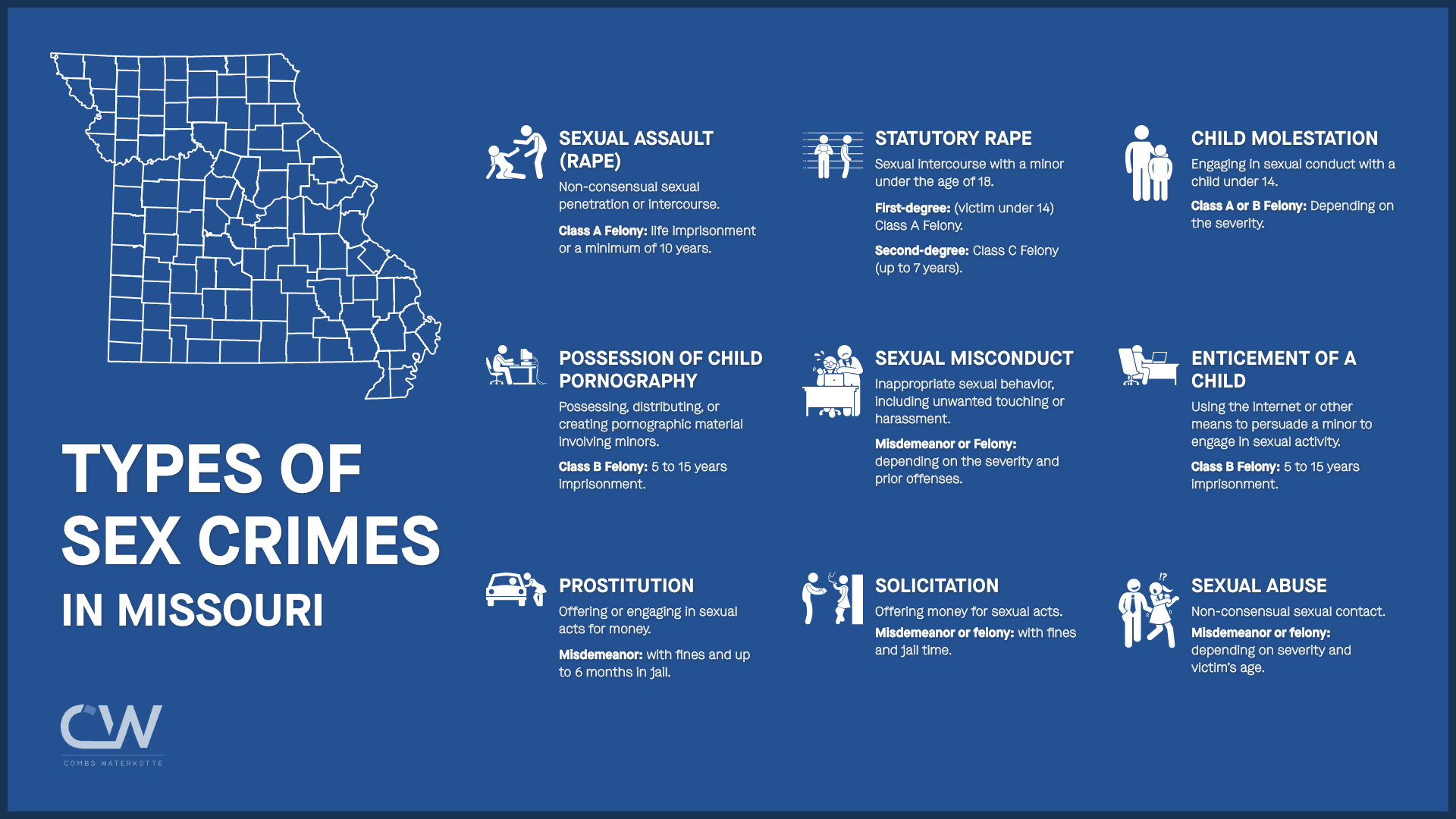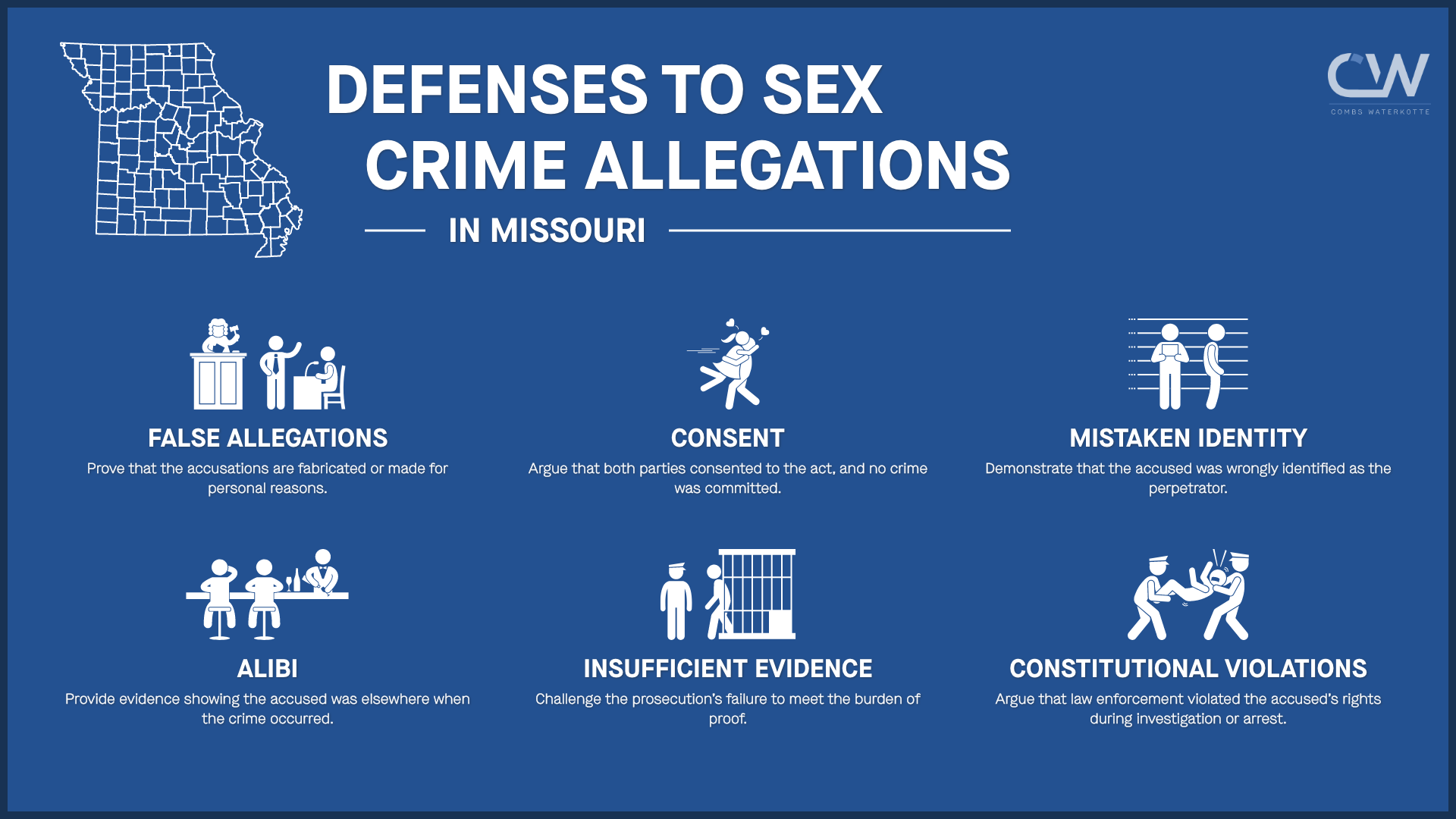Sex crimes can be difficult to navigate from a defense perspective. As committed sex crime lawyers serving St. Louis, Kansas City, and all of Missouri, our team at Combs Waterkotte is here to offer legal support and help you or a loved one through these difficult times.
Below are a few of the most common questions we receive about sex crimes and answers that can help your case.

Table of Contents
- What Are Common Types of Sex Crimes in Missouri?
- What Are the Penalties for Sexual Assault in Missouri?
- Common Defense Strategies in Missouri Sex Crime Cases
- How Do I Prove My Innocence in a Sex Crime Case?
- Can I Be Arrested for a Sex Crime Without Evidence?
- What Should I Do If I’m Accused of Sexual Assault?
- What Happens When You Are Wrongfully Accused of a Sex Crime?
- Can I Sue for Being Falsely Accused of a Sex Crime?
- What’s the Legal Age of Consent in Missouri?
- What Happens When You Are Charged With a Child Sex Crime?

What Are Common Types of Sex Crimes in Missouri?
Missouri prosecutes a wide range of sex crimes — from non-consensual sexual contact to online offenses involving minors. Many of these charges carry mandatory prison time, lifetime sex offender registration, or both. Below are some of the most common offenses and how they’re typically charged under Missouri law.
- Sexual Assault (Rape): Non-consensual sexual intercourse. Usually charged as a Class A felony.
- Statutory Rape: Sexual activity with a minor under 18. Often a Class A or Class C felony depending on the age of the alleged victim.
- Child Molestation: Sexual conduct with a child under 14. Typically charged as a Class A or Class D felony.
- Possession of Child Pornography: Possessing, creating, or distributing explicit material involving minors. Often a Class B felony.
- Sexual Misconduct: Inappropriate sexual behavior such as unwanted touching, public exposure, or harassment. Can be a Class A misdemeanor or a felony, depending on the facts and priors.
- Enticement of a Child: Using the internet or other methods to persuade a minor to engage in sexual activity. Typically a Class B felony.
- Prostitution: Offering or engaging in sexual acts for money. Usually a Class B misdemeanor.
- Solicitation: Offering money to engage in sexual activity. May be charged as a misdemeanor or felony, depending on the circumstances.
- Sexual Abuse: Non-consensual sexual contact that doesn’t meet the threshold for rape. Can be a Class C or Class D felony.

What Are the Penalties for Sexual Assault in Missouri?
Sexual assault charges in Missouri carry some of the harshest penalties under state law — including long prison sentences, lifetime sex offender registration, and severe parole restrictions. The exact punishment depends on the specific charge, whether the alleged victim was a minor, and whether prosecutors classify the defendant as a “persistent” or “predatory” offender.
- Rape – 1st Degree:
- 5 years to life in prison
- 15 years to life for an aggravated sexual offense
- Life without parole if classified as a “persistent” or “predatory” sexual offender
- Life with parole eligibility after 30 years if the alleged victim is under 12
- Life without parole if the victim is under 12 and the offense involved torture or inhumane acts
- Rape – 2nd Degree: A Class D felony punishable by up to 7 years in prison.
- Statutory Rape – 1st Degree:
- 5 years to life in prison
- 10 years to life if the victim was under 12 or if the offense is considered aggravated
- Life without parole for persistent or predatory offenders
- Statutory Rape – 2nd Degree: Also a Class D felony.
- Sexual Abuse – 1st Degree:
- Charged as a Class C felony: 3–10 years in prison
- Elevated to a Class B felony (5–15 years) if the victim is under 14 or the offense is aggravated
- Sexual Abuse – 2nd Degree:
- Usually a Class A misdemeanor: up to 1 year in jail and a $2,000 fine
- Upgraded to a Class E felony if it involves an aggravated offense
These penalties don’t include lifetime consequences like mandatory registration, parole restrictions, or the loss of civil rights. That’s why an early and aggressive legal defense is essential — especially in cases where the facts are disputed or no physical evidence exists.
Common Defense Strategies in Missouri Sex Crime Cases
No two cases are the same, but there are proven defense strategies that can make or break the outcome. If you’re facing a sex crime charge, your lawyer’s job isn’t just to react — it’s to go on offense. These legal strategies form the backbone of most successful defenses:
- False Allegations: Show that the accusation was made up — whether out of revenge, fear, regret, or pressure from someone else.
- Consent: Argue that the encounter was fully consensual, and that no crime actually took place.
- Mistaken Identity: Prove that you weren’t the person involved — often through flawed photo lineups, misidentification, or lack of physical evidence.
- Alibi: Present solid proof that you were somewhere else when the alleged crime happened — through witnesses, digital records, or security footage.
- Insufficient Evidence: Challenge the prosecution’s case and expose the gaps. They have the burden of proof — not you. If they can’t meet it, the case should fall apart.
- Constitutional Violations: Suppress evidence if police broke the rules — like illegal searches, coerced statements, or ignoring Miranda rights.
Choosing the right defense isn’t about checking a box — it’s about knowing what works with prosecutors, judges, and juries. If you’ve been accused, don’t wait to start building your side of the story. Get in touch with our legal team now.

How Do I Prove My Innocence in a Sex Crime Case?
While it’s true that the prosecution has to prove guilt beyond a reasonable doubt, presenting strong, credible evidence can be the difference between dismissal and conviction. These are the kinds of evidence we often use to defend clients accused of sex crimes:
Depending on the facts, this may include:
- Witness statements that contradict the allegations or support your character.
- Text messages, emails, or social media posts that show consent or challenge the accuser’s version of events.
- Phone records or location data proving you were not at the alleged scene.
- DNA evidence or lack of physical evidence supporting your defense.
- Past false allegations made by the accuser, if admissible.
Sex crime accusations often come down to one person’s word against another’s. Having an experienced sex crime defense lawyer is critical to challenge the prosecution’s case, for cross-examining witnesses, and presenting evidence that raises reasonable doubt.
Can I Be Arrested for a Sex Crime Without Physical Evidence?
Yes — you can be arrested for a sex crime even if there’s no physical evidence. A detailed accusation or sworn statement is still considered evidence, so police may be able to establish probable cause for an arrest based on the accusation alone. The state may need more evidence down the road to convict you, but you can be charged, booked, and forced to defend yourself before a full investigation takes place.
Sex crime cases often come down to one person’s word against another’s. That’s why hiring a defense lawyer early matters — they can protect your rights, push back against weak or biased investigations, and begin building a defense before charges stick.

What Should I Do If I’m Accused of Sexual Assault?
Being accused of sexual assault is serious — and what you do in the first hours and days can have a major impact on your case. Follow these steps to protect your rights and avoid making the situation worse if you’re accused of a sex crime in Missouri:
- Stay Calm and Avoid Confrontation
- Do not engage with the accuser: Avoid all contact — even texts or messages through friends. Anything you say can be used against you.
- Do not try to explain or justify: Don’t offer your side to police, the accuser, or anyone else without legal counsel.
- Contact an Experienced Sex Crimes Attorney
- Hire a lawyer ASAP: Choose someone who has specific experience defending sex crime cases in Missouri.
- Follow your lawyer’s guidance: Don’t take any action — including making public statements — without legal advice.
- Exercise Your Right to Remain Silent
- Do not talk to police or investigators: You are not required to provide a statement or answer questions.
- Invoke your Fifth Amendment rights: Firmly but politely say, “I want to invoke my right to remain silent” or “I will not speak without my attorney present.”
- Gather Evidence and Document Your Side
- Save communications: Keep any relevant texts, emails, or social media messages.
- Write down what happened: Include dates, times, people present, and any relevant interactions.
- Secure physical evidence: Keep clothes, receipts, photos, or anything else that may support your defense.
- Build a Defense with Your Attorney
- Be honest: Give your lawyer all information — even if you think it makes you look bad. Your attorney can’t defend what they don’t know.

What Happens When You Are Wrongfully Accused of a Sex Crime?
Getting accused of something you didn’t do is overwhelming, especially when it’s a serious charge like a sex crime. Even if the accusation is false, you can still be investigated, arrested, or charged.
Don’t panic — and don’t try to handle it yourself. Trying to explain your side to the police or the accuser could make things worse. What you say might be twisted or taken out of context.
The best steps are to:
- Find proof that the accusation is false
- Show why the accuser might be lying or mistaken
- Use evidence like texts, calls, or location data to support your side
- Try to get the case dropped before it goes to court
Document everything you can and be honest with your legal team.
These situations can be scary — but you’re not helpless. Talk to a criminal defense lawyer right away so they can protect you before things get out of hand.

Can I Sue for Being Falsely Accused of a Sex Crime?
Yes, you may be able to sue for damages if you were falsely accused of sexual assault — but only under certain conditions.
To win a civil lawsuit, you generally must prove that the accusation was knowingly false, caused you measurable harm (like lost income or reputation damage), and wasn’t protected by legal privileges (like testimony) in court proceedings.
Defamation (libel or slander) is the most common basis for a false accusation lawsuit. However, these cases are difficult because courts give broad protections to statements made to police, during investigations, and inside the courtroom.
What’s the Legal Age of Consent in Missouri?
In Missouri, the legal age of consent is 17. Anyone under 14 is never legally able to consent to sexual activity. Teens ages 14-16 cannot consent to someone who is more than four years older. If that age gap is exceeded, the older person can face charges like statutory rape or child molestation — both of which carry extremely serious penalties.
Missouri does not have a formal “Romeo and Juliet” law. Prosecutors cannot overlook age gaps and other circumstances (long-term relationships, etc.) that violate the laws. If you’re under investigation, do not assume your intent or the relationship history will protect you. Talk to a criminal defense attorney right away.
What Happens When You Are Charged With a Child Sex Crime?
If you’ve been charged with a child sex crime in Missouri, you’re facing some serious penalties. The state wants these cases to move fast, and even the charge alone can lead to restrictions before trial.
Most child sex crime charges fall under offenses like child molestation, statutory rape, sexual misconduct with a minor, or possession of child pornography. Depending on the charge and the age of the alleged victim, you could face:
- Felony charges with long mandatory prison sentences
- Sex offender registration — often for life
- Loss of custody or contact with your children, even before trial
- Strict bond conditions, including house arrest or no internet access
If you’re accused, do not talk to police, the accuser, or their family. Anything you say can be used against you. Instead, contact a criminal defense lawyer immediately — preferably one with experience handling child sex crime charges.
In some cases, charges may be dropped or reduced — but that depends on the facts, the evidence, and how early your attorney can get involved. Prosecutors, not alleged victims, decide whether to move forward, and they often pursue child-related cases aggressively regardless of cooperation. Don’t wait to get help.


Free book
How a Criminal Defense Attorney Can Protect Your Rights and Future
Combs Waterkotte has over 60 years of experience and over 10,000 cases handled. This ebook helps guide you through the criminal defense process and how an experienced, skilled defense attorney can keep your freedoms intact.
Why Combs Waterkotte for Criminal Defense for Sex Crimes in Missouri?
Our legal team has helped countless victims in a precarious situations. Don’t hesitate to contact our Missouri Sex Crime Lawyers today or give us a call at (314) 900-HELP to learn more about your rights.






